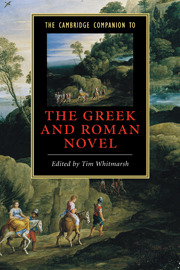8 - Body and text
from Part II - The world of the novel
Published online by Cambridge University Press: 28 June 2008
Summary
The bodies of the ancient novels are hard to ignore: beautiful, chaste bodies, god-like bodies, ugly bodies, dead bodies, fragmented bodies, penetrated bodies, animal bodies, bodies that are hard to tell apart from one another. The novels confront us with these forms insistently. Some of them look easy to interpret, as shining examples of chastity and virtue, qualities that manifest themselves inevitably in beauty. But many of them are enigmatic, unstable, hard to fathom. Here I want to emphasise two main issues in the challenge of reading the novels' bodies: first the way in which these texts both proclaim and problematise the status of physical appearance as a guarantor of inner identity; and second, the way in which the bodies they present us with are so often equivalent in form to the texts themselves, metaphors and mirrors for the very experience of reading. / Bodily integrity and elite identity / The elite society of the imperial period was preoccupied with the way in which social status left its marks on the surface of the human body. The way you dressed, the way you carried yourself, the way you exercised your body said a great deal about who you were. This was an age when gymnasium education, rhetorical prowess (with its obsessive attention to the bearing and physical training of the orator), and philosophically informed attention to bodily self-care were more prestigious then they ever had been, and when public violation and mutilation of the body in punishment were used more routinely and extravagantly than before to signify loss of social status or political influence.
- Type
- Chapter
- Information
- The Cambridge Companion to the Greek and Roman Novel , pp. 127 - 144Publisher: Cambridge University PressPrint publication year: 2008
- 10
- Cited by



